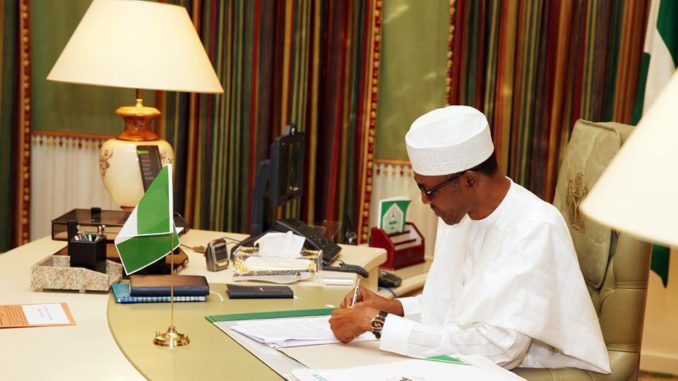
On May 29, 2015, Muhammadu Buhari took the oath of office as the elected president of Nigeria after defeating the incumbent President Goodluck Jonathan of the People’s Democratic Party (PDP).
Tuesday marks Mr Buhari’s third year in the saddle of Africa’s most populous nation.
While campaigning across the country in 2015, Mr Buhari, who contested under the then opposition party, All Progressives Congress, (APC) adopted “Change” as mantra.
Six month after he was sworn in, Mr Buhari inaugurated 36 ministers on November 11, 2015 to man 24 federal ministries.
The presidency recently reeled out what the Muhammadu Buhari administration said it had achieved in the last three years ahead of Democracy Day.
PREMIUM TIMES, however, presents a three-year scorecard of Buhari’s administration based on his campaign and other promises made on assumption of office and others made thereafter in the education sector.
Promises Made So Far
-Full review of the Universal Basic Education Act with emphasis on gender equity in primary, secondary school enrolment whilst improving the quality and substance of our schools.
-Targeting up to 20 per cnt of annual budget for this critical sector whilst making substantial investments in training quality teachers at all levels of the educational system.
-Reduce malpractices in the sector to a low level.
-Enhance teacher training and improve the competence of teachers in the light of the 21st Century.
– Provide one meal a day for all primary school pupils as this will create jobs in agriculture, catering, and delivery services.
-Develop and promote effective use of innovative teaching methods/materials in schools.
-Ensure a greater proportion of expenditure on university education to help improve the sector.
-Establish at least six new universities of Science and Technology with satellite campuses in various states.
-Address the out-of-school children phenomenon.
-Ensure 30 million Nigerians become literate within three years.
-Re-negotiate the 2009 Agreement with unions in tertiary sector.
-Academic stability at all levels.
-Attracting best brains to the teaching profession.
-Reducing the percentage counterpart fund paid by states to ease their access to funds.
-Providing e-learning, technical and vocational education and training, education data and planning and adult literacy including special needs education.
-Providing educational support to deportees.
-Re-emphasising ban on tuition fees in federal universities
Achievements recorded
-Presented a roadmap for ‘radical change’ in the education sector between 2016 and 2019.
-Introduction of national headcount of pupils and personnel in all primary and junior secondary schools.
-Compulsory basic education for pupils especially in Bayelsa State
-Implementation of open distance and flexible learning for 25 polytechnics.
-Approval of N1.9 billion intervention fund for each university.
– Introduction of the school feeding programme.
-Modification of the United Tertiary Matriculation Examination (UTME) for candidates seeking admission into the higher institutions of learning by introducing Central Admission Processing System.
– Making JAMB, Nigeria’s foremost admission body to tertiary institutions, not only more transparent, but also more productive.
-Approval of 15 university online learning centres.
-Revamping data-collection system in the education sector.
-Introduction of Teachers’ professional examination.
-Conducting assessment of its basic schools which held last in 2011 under the previous administration.
-Ended OND/HND dichotomy in the paramilitary services.
Challenges
In the three years, major unions within the education sector have had cause to down tools, putting students, parents and the entire country in a state of frustration.
A bigger cause for distress came on February 19, 2018, when 110 schoolgirls, aged 11–19 years old were kidnapped by the Boko Haram terrorist group from the Government Girls Science and Technical College (GGSTC), Dapchi, in Yobe State. Although 105 girls and a boy were released, a Christian student, Leah Sharibu has not been released for reportedly failing to renounce her faith.
Similarly, in August 2017 , Boko Haram terrorists extended their bloodletting to students and staff in the University of Maiduguri, killing and maiming.
In the midst of the chaos, LAUTECH was shut down for about a year due to lack of funding from owners (Oyo and Osun state governments). Meanwhile some vice chancellors, provosts and workers were also involved in corruption allegations.
Failures
-Nigeria’s literacy level has not reduced. The nation currently has over 65 million illiterates, according to UNESCO.
-Incessant strike action in Nigeria’s polytechnics and universities at different times during the Buhari administration which has crippled the sector.
-Funding of education: Only seven per cent was allocated to the education sector in 2017 against the stipulated 15 to 20 per cent proposed by the UNESCO.
-About 10.5 million school aged Nigerian children are out of school, making the country one of the highest in the world.
-There is still proliferation of unregulated private schools with dismal standards.
–Decline in teaching profession. Over 40 per cent of Nigerian teachers are not qualified as they do not possess the prescribed minimum qualifications for teaching.
– 5About 0 per cent of Nigerians with post-secondary school qualification are underemployed or unemployed, according to findings by the National Bureau of Statistics (NBS).
-Only 450,000 of the nomadic school-aged children are accessing any form of schooling out of the estimated 3.5 million.
-Poor data-base of the sector which has led to missing out in educational grants.
-Unabated decline in quality of education.
-Insecurity in schools and higher institutions.
-Increased in examination malpractice in schools.
-Inadequate funding of the sector.
Despite all the achievements claimed as recorded by the administration in the education sector, the 2018 World bank report released in March says only 20 per cent of young Nigerian adults who have completed primary education can read.
Overall, while the administration has indeed made some signifant strides in the education sector, there are still several challenges yet to be tackled.
Score: 50 per cent.
END

Be the first to comment